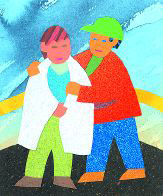Stop fretting. It’s quick, painless, and oh, so deeply satisfying to take care of those last-minute folks on your list by making a donation in their names. What do people absolutely need? Food, shelter, warmth, health. How can these be provided? Here’s one highly selective list of possibilities.
Heifer International (P.O. Box 8058, Little Rock, AR 72203; 1-800-422-0474; www.heifer.org) says it has “the most important gift catalog in the world.” That is big talk, backed up by big works. Heifer International feeds the hungry around the world—last year in 48 countries, including the Dominican Republic, Bolivia, China, India, Afghanistan, Tanzania, and Rwanda. The great part is, they give gifts that keep on giving. The recipient of a donated heifer gets milk and excess milk to sell; that heifer’s firstborn goes to yet another needy family, and soon . . . you get the picture? It’s a village where everyone owns cattle. You can also donate a milk menagerie (heifer, two goats, and a water buffalo), goats, pigs, sheep, rabbits, chicks, bees, llamas, and/or tree seedlings. Prices range from $500 for a heifer to $30 for honeybees.
Closer to home, there’s Northwest Harvest (P.O. Box 12272, Seattle, WA 98102; 206-625-0755; www.northwestharvest.org) and Food Lifeline (1702 N.E. 150th St., Shoreline, WA 98155; 206-545-FOOD; www.foodlifeline.org). (Think: laid off, kids, mortgage payments, good deeds.)
Real Change (2129 Second Ave., Seattle, WA 98121; 206-441-3247; www.realchangenews.org) is a Seattle group that organizes, educates, and builds alliances to create solutions to homelessness and poverty. Each issue of their twice-monthly newspaper Real Change contains 32 pages of quality journalism, poetry, opinion, art, and photography, much of it produced by poor and homeless people. A subscription donation is $25.
The Broadview Emergency Shelter and Transitional Housing Program (P.O. Box 31151, Seattle, WA 98103; 206-299-2500; www.fremontpublic.org) is a program of the Fremont Public Association. It provides services for homeless women, youth, and children. It strives to meet immediate basic needs of shelter and safety while addressing whatever it was that led to the displacement of the people it assists.
Operation Sack Lunch (P.O. Box 1231, Clinton, WA 98236; www.opsacklunch.org) serves about 3,500 meals each week in the Seattle area from the backs of its vans, reaching out to homeless children, women, and men without any requirements or judgment. That is just one of five programs the group runs: The sleeping-bag fund has a yearly goal of 2,000 delivered to those in need; an outreach program introduces this work to businesses, civic and faith-based groups, and schools; the Mather Emergency and Education Fund helps fund emergency housing, job training and other education, and medical emergencies for the homeless. There is also a twice-yearly newsletter. If you have time to give, Susan Dailey is the volunteer coordinator (425-820-2932).
Puget Sound Energy (see the checkoff on your energy bill) operates the Warm Home Fund in partnership with the Salvation Army (P.O. Box 9219, Seattle, WA 98109; 1-800-736-7291; www.nwarmy.org), assisting qualified low-income families who face a possible loss of electric or natural-gas service. Seattle City Light operates Project Share (700 Fifth Ave., Suite 3300, Seattle, WA 98104; 206-684-3000; www.cityofseattle.net; a flyer comes with your bill). It can help a family pay its electric bills during emergencies.
Doctors Without Borders (West Coast office: 2040 Avenue of the Stars, C-216, Los Angeles, CA 90067; 310-277-2793; www.doctorswithoutborders.org) delivers emergency aid to victims of armed conflict, epidemics, and natural and man-made disasters. They also strive to help those who lack health care because of social or geographic isolation, and they bear witness and speak out on the plight of people at risk around the world. Each year, more than 2,500 volunteer doctors, nurses, other medical professionals, logistics experts, water/sanitation engineers, and administrators join 15,000 locally hired staff members to provide medical aid in more than 80 countries.
Global Partnerships (1300 Norton Building, 801 Second Ave., Seattle, WA 98104; 206-652-8773; www.globalpartnerships.org) supports programs in Latin America that help people overcome poverty. One branch is the MicroEnterprise Fund, which makes small loans to people living in poverty. Recipients, mostly poor women, use the money to create, sustain, and build small businesses, which allows for a 98 percent repayment rate, not to mention improving lives and creating all sorts of options that were not previously possible, such as higher levels of education.
Finally, make it a habit to go to www.thehungersite.com each day. Tim Kunin and Greg Hesterberg, owners of EcologyFund.com, own the Hunger Site, which solicits site sponsors that pay for food donations to people around the world. Your click (it costs you nothing!) will send one cup of food from the Hunger Site and help pay for mammograms, child health care, saving the rain forest, and animal rescue efforts. JJill.com, the Alabama Gulf Coast Visitors Bureau, Tupperware.com, OfficeMax.com, and Dell Computer are among recent site sponsors.







